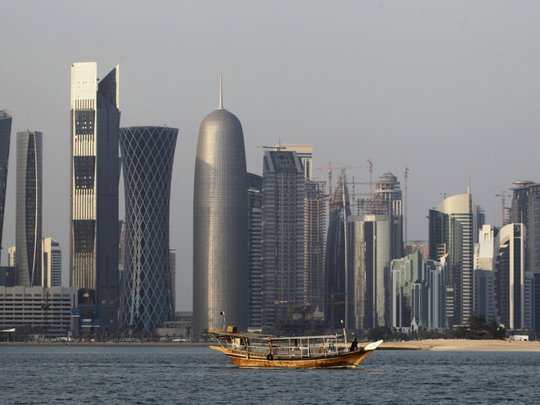
Qatar’s leadership has displayed a brazen apathy in the last few months. The lack of any strategy in Doha is not only baffling, it is outrageous too.
Economy is at the core of political and strategic decision-making in any country. But in Qatar, the economic considerations and the interests of the people are disregarded. It has now become apparent that the decision-making in Doha serves the leadership, not the people of Qatar.
Call it a combination of bad advisers and lack of strategic focus, the country is in a free fall. The Qatari economy has been deteriorating since the beginning of the crisis in the region. The latest indication comes from Standard & Poor’s, which changed the outlook on the economy to “negative”, expecting slow growth and impeded financial performance. The agency attributed the negative outlook to the potential repercussions of the boycott on the economy and budget.
Qatari banks are struggling to cope with the impact of the crisis by trying to issue bonds to borrow from abroad. The borrowings attracted a higher rate due to the increased risk after the boycott as $7.5 billion (Dh27.58 billion) of foreign deposits and $15 billion of deposits and interbank loans have been withdrawn, according to Qatar’s Central Bank. Analysts expect banks to lose more than $3 billion to $4 billion in deposits in Doha over the next few months, prompting the rating major Fitch to warn of the large negative impact of non-local deposits withdrawal from Qatari banks.
Moody’s lowered the outlook for nine major Qatari banks from “stable” to “negative” and maintained a negative outlook for a bank. Negative ratings for these banks are based on factors such as poor operating environment, especially for bank financing, and reduction in the government’s capacity to support local banks, which led to lower macroeconomic indicators.
Some may argue that sovereign credit ratings by specialised international agencies only indicate a country’s ability to get international loans, and that Qatar does not need them. But let’s not overlook the strategic dimension in these estimates. Even the United States’ economy that generates a quarter of the world’s gross domestic product is shaken by any negative estimates by these institutions, as is the case with all major economies. The issue is no longer about loans, which are traditionally obtained by countries under difficult economic conditions, but because these estimates are a compass of capital flows and foreign capital and investment. They are indicators of the efficiency of the financial management of the economies, and thus revealing indicators.
The issue also has other economic dimensions. Negative estimates of economies push countries to paying back higher returns and benefits on sovereign issuances of treasury bills, bonds or cheques, as well as reducing the attractiveness of those issuances in global markets. Every country is influenced by this complex and intertwined global economic environment that shapes investment and cash flow.
These estimates and international rankings also affect the price of national currencies and exchanges, especially in light of the increasing opportunities for competition and the weakness of the attractiveness of the Qatari financial market primarily from the pressures of boycotts and unclear future due to political mismanagement by the palace.
Doha officials should carefully read reports of international financial research institutions on the Qatari economy and its future prospects. One report said the crisis makes it more difficult to predict Qatar’s policies. For any strategic planner, with unpredictable policies comes the risk of a disaster if the leadership is not careful enough.
It is painful to see what is happening to the Qatari people because of the decisions of a regime that is more concerned about protecting a bunch of conspirators housed in Doha hotels and to spend the money another bunch in Istanbul, Ankara and other places.
Dr Salem Al Ketbi is an Emirati political analyst, researcher and opinion writer.









